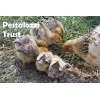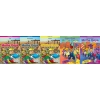Meetings between homeschoolers & government
Report by Taryn Hayes on meeting with Cheryllyn Dudley, MP for ACDP on the topic of: “How Parliament impacts Education and through Education impacts a Nation” at Fish Hoek Homeschooling Expo, Saturday 1 March 2014
Background
In mid-February 2014, the Western Cape Education Department released the Draft 8 Policy Document for Home Education in the Western Cape for comment. Draft 8 included all the current policy’s regulations as well as at least two additional regulations. Draft 8 was considered by the home education community to be even more restrictive than the current policy document (1999) and was met with great protest nationally.
This led to the withdrawal of the document by the Western Cape Education Department within a week of its release. It also led to much discussion in the homeschooling community in South Africa around the issue of regulation and how best to contribute towards better representative education laws and regulations. This has since led to the formation of a steering committee for a unified approach by the Cape Home Educators, electing members from the greater homeschooling community in the Western Cape. It also sparked an informal investigation by Cheryllyn Dudley, MP for the ACDP and home education advocate. Dudley and the ACDP have long been champions of home education at government level, with the ACDP playing a large role in helping legalise home education in the mid- to late-1990s.
Shortly after the withdrawal of the Draft 8 policy document, Dudley informally contacted key government players in the education field in an attempt to gauge where government stands on the home education question. Through the Facebook group, Homeschool Western Cape; Andrew Worrel, ACDP Branch Chairman (Durbanville) and the Triangle Square Academy’s homeschool expo organiser, Phillip Gitten and opportunity was afforded to the home education community to speak with Cheryllyn Dudley. Dudley was able to share with home educators some of her findings at a meeting held at the Fish Hoek Homeschool Expo on Saturday, March 1, 2014 with a talk and Q&A session entitled: How Parliament impacts Education and through Education impacts a Nation.
Summary of meeting with Cheryllyn Dudley, MP for ACDP, Saturday, 1 March, 2014, 3pm-5pm
Dudley began the meeting with a brief overview of home education and the government’s position on home education since 1999. She said, in summary:
From 1999 – 2009, under the Mbeki administration, there was an underlying mutual distrust between government and the home education community. Government was particularly concerned that home educators could “go underground” and create a subversive South Africa within South Africa that would undermine the fragile new democracy.
Under the Zuma administration, some positive changes have taken place. There has been greater accountability amongst the government agencies. And the distrust from government side with regards to home education has slowly begun to thaw. Dudley said that she has long been interacting at a national level with government bodies, working alongside them to help shape legislation. She has a good, open relationship with national policy makers and ministers. The feedback that she received from numerous quarters in the education department was very positive. Namely: the government has recognised the benefits of homeschooling as well as the constitutional right to home educate and they want to protect and support this right.
With this background, there still remains certain concerns that will inform government’s decision making when it comes to policy documentation. They have to ensure that the rights of the child are protected to the best of their ability. For this reason, the 1999 policy document is being reviewed on a national level with the view to have a new draft policy in place around August 2014. Dudley has explained to government stakeholders that it is advisable to include home educators from the start of the review process, given that the document directly affects them and that they can contribute valuable insight to the process. The feedback from government was positive – they would like a comprehensive list of those who would like to be involved so that they can keep communication channels open.
Dudley thus advised that the time is ripe for home educators to approach government with a unified voice – not antagonistically, but rather with the view to help. She applauded the formation of groups like the CHE’s Steering Committee for Education and encourages home educators to get alongside government through CHE’s committee and other bodies that aim to approach government with constructive help. She made the point that it will take a long time (if ever) before legislation fully represents freedom in educational choices, but that we can make a difference little by little through positive engagement with government, developing positive relationships and contributing information that is reasoned and clear.
Thereafter, Dudley opened the floor to questions. Concerns were expressed about, amongst others:
- the level of regulation and the restrictions placed on home educators;
- the misunderstanding by government of what home education actually is and how it functions;
- the expectation of being aligned to CAPS and what the implication of that is;
- motives of government officials in creating policies to represent personal interests;
- the possibility of self-regulation
In summary, Dudley said that, at present, the policy documentation is restrictive and that government would probably want home education to be aligned with CAPS as they consider it the best vehicle by which to keep accountability in the various education sectors. Self-regulation is highly unlikely, as it has not worked in so many other spheres of society, and because education is such a key legislative issue, it is unlikely that government would want to relinquish control to that degree. This is simply how things are currently and our starting base for change. To help change perceptions and shape new policies that better represent home educators, it is important for home educators to show government and the greater public the positive peculiarities of homeschooling, through reasoned discussion and explanation. We need to be available to help government. We need to persevere and not give up. She cautioned against aggressive, militant attacks – specifying this approach’s failure in parliament by other parties who use heckling and accusations to ridicule the other party, but to no constructive end that benefits the people of South Africa. She also gave examples of successes that the ACDP have managed to attain in legislative decisions simply by being reasoned and friendly in their approach, keeping communication channels open. She reiterated that this will be a long process, but that it was worth pursuing.
Some suggestions came from the floor in how to create a better perception of homeschooling – including reaching out to underprivileged communities and so forth. Dudley said that while that is a noble and good thing to do, it would be unlikely to affect government’s perceptions of home educators as a whole – and, if anything, be viewed with suspicion (as an ulterior motive). She cautioned against doing anything that was manipulative, but rather to do what aligns with our clear conscience.
While this meeting was set up primarily to get an insider’s view of the current stance of government and not to push a certain political viewpoint, it is impossible to stay away from the political question entirely. Many questions revolved around the political agendas of various parties. In short, Dudley said that the quickest way to changed legislation that best represents the home education community was to vote for the ACDP as the ACDP supports the rights of home education. She explained that the ACDP has been able to, with a small number of seats, make significant inroads in legislation that positively affects South Africans. She also noted that the feedback their party has received from the ground around this election is that the ‘vote for a strong opposition’ argument has lost its persuasive power as people have been disappointed with the last 5 years of rule. She noted that the trend seems to have shifted to voting for the party that best represents one’s own philosophy and beliefs – she feels that is a positive move towards a multi-party government that better represents the diversity of our country in a unified manner.
The meeting lasted approximately two hours. The main message is summarised as follows:
The current climate in government regarding home education is cautiously positive. The general feedback at this stage is that government recognises the constitutional rights of home educators/educated and they want to work towards protecting and supporting this right. However, there are still many misunderstandings of what home education is and how it best functions in each situation. Policy documentation is up for review this year, with the aim of having a new draft policy by August 2014, therefore the time is ripe for home educators to get alongside government in helping shape new policy. The government welcomes involvement from the home education movement as significant stakeholders. The process will be slow. We should expect small victories along the road of true freedom in home education. But we can be confident that we have a friendlier audience with the government than we had in the last decade. Home educators should feel free to contribute ideas and thoughts in a reasoned and reasonable tone and manner, with the intention of getting alongside government to help create policy that better represents home education in South Africa.
This document was written by Taryn Hayes in an attempt to fully summarise the meeting between interested home educators in Cape Town and Cheryllyn Dudley, ACDP MP and home education advocate for the benefit of those who could not attend the meeting. 3 March, 2014. E&OE
Legal & Research
Centres
Homeschool ABC
Support
Curriculums
Learn, code and create with Ubbu
Introducing ubbu!An Adventure of Code and Play! Learn, Code ...
Clowder Bookstore for Homeschool ...
Explore The Clowder Bookstore. Our primary focus is on ...
Has no content to show!
































